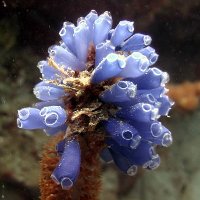
Britain, serious injury or muscle damage is often the cause of disability (disability) in person permanently. The new findings on the fine hair of ancient marine species may be new hope for people with disabilities and people who suffered serious injuries.
New research at Manchester University, England, found that the fine hair of ancient marine species that has existed since 500 years ago, known as the tunicate or Urochordata, has the potential to repair muscle damage because it has an incredible regeneration properties.
The researchers claim that the microscopic hairs on the creature is made of a compound that can act as a building block (builder) to work on human muscle tissue.
This discovery potentially opens the way to treat patients with serious injuries or permanent disability.
Biomaterials expert at Manchester University found that fine hair like whiskers on the bottom of the sea creatures were made of a compound called cellulose.
Although cellulose is generally found in most plants, but the hair with a billionth of a meter of this size has the ability to promote muscle cells are damaged 'knit' back together.
Stephen Eichhorn and biomedical experts, Julie Gough and James Dugan has managed to extract the chemicals 'whiskers nano' is. They found that when aligned and parallel to each other, it can cause the hair cells are damaged muscles heal faster.
"I believe the cellulose which is extracted from this creature can repair existing muscle or even grow muscle from scratch. Although chemical process is quite detailed, potentially very interesting applications," explained Dr Stephen Eichhorn, biomedical expert at Manchester University, England, as reported by Dailymail, Friday (03/18/2011).
According to Dr. Eichhorn, cellulose being ogled by many scientists around the world as new medical materials, because it is unique and is a natural resource that can be renewable.
"But this is the first time that has been used for skeletal muscle tissue engineering applications. There is potential for muscle precision engineering, architectural structures but also for other aligned as ligaments and nerves," continued Dr. Eichhorn.
Tunicate, also known as Sea Squirt Squirt or marine animals (a type of marine animals are attached at the bottom of the sea, that will shrink his body to give off water) grow in different shapes and sizes, which can be found on the seabed around the globe.
Marine biologists say that this species is closely related to vertebrates, including fish and marine mammals.
In addition to repairing damaged muscle, studies of tunicate've pretty much done. The scientists believe this species also contains anti-viral compounds, which can be effective against various cancers.
Tidak ada komentar:
Posting Komentar